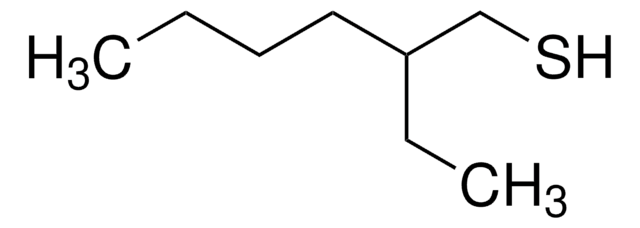O1858
1-Octadecanethiol
98%
Synonym(s):
Mercaptan C18, Octadecyl mercaptan, Stearyl mercaptan
About This Item
Recommended Products
Quality Level
Assay
98%
bp
204-210 °C/11 mmHg (lit.)
mp
30-33 °C (lit.)
density
0.847 g/mL at 25 °C (lit.)
SMILES string
CCCCCCCCCCCCCCCCCCS
InChI
1S/C18H38S/c1-2-3-4-5-6-7-8-9-10-11-12-13-14-15-16-17-18-19/h19H,2-18H2,1H3
InChI key
QJAOYSPHSNGHNC-UHFFFAOYSA-N
Looking for similar products? Visit Product Comparison Guide
General description
Application
Signal Word
Warning
Hazard Statements
Precautionary Statements
Hazard Classifications
Aquatic Acute 1 - Skin Irrit. 2
Storage Class Code
11 - Combustible Solids
WGK
WGK 3
Flash Point(F)
Not applicable
Flash Point(C)
Not applicable
Personal Protective Equipment
Choose from one of the most recent versions:
Already Own This Product?
Find documentation for the products that you have recently purchased in the Document Library.
Customers Also Viewed
Articles
Self-assembled monolayers (SAMs) have diverse applications; article compares benefits of alkylthiolates on gold SAM systems.
Our team of scientists has experience in all areas of research including Life Science, Material Science, Chemical Synthesis, Chromatography, Analytical and many others.
Contact Technical Service














